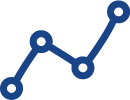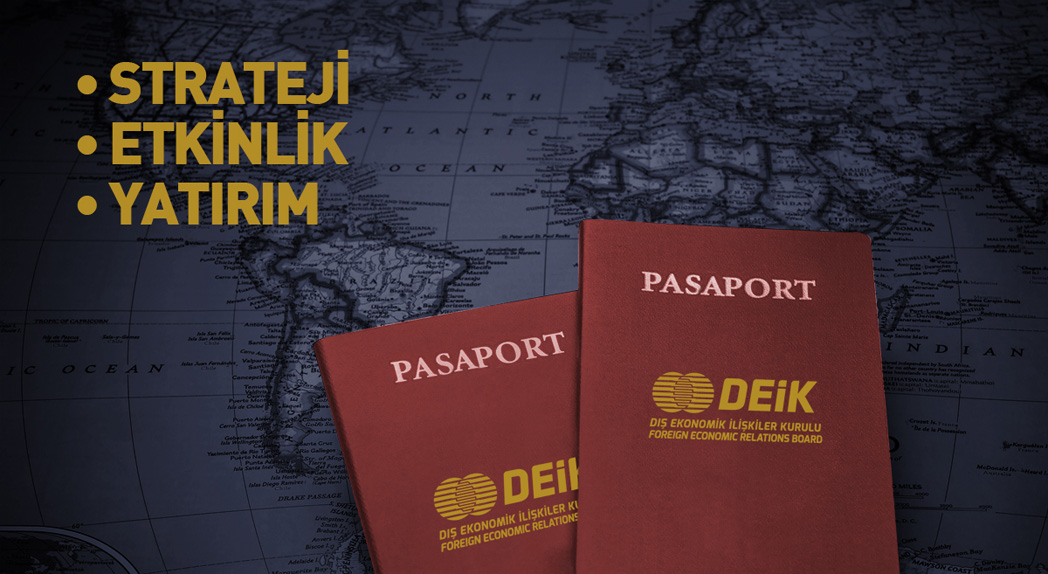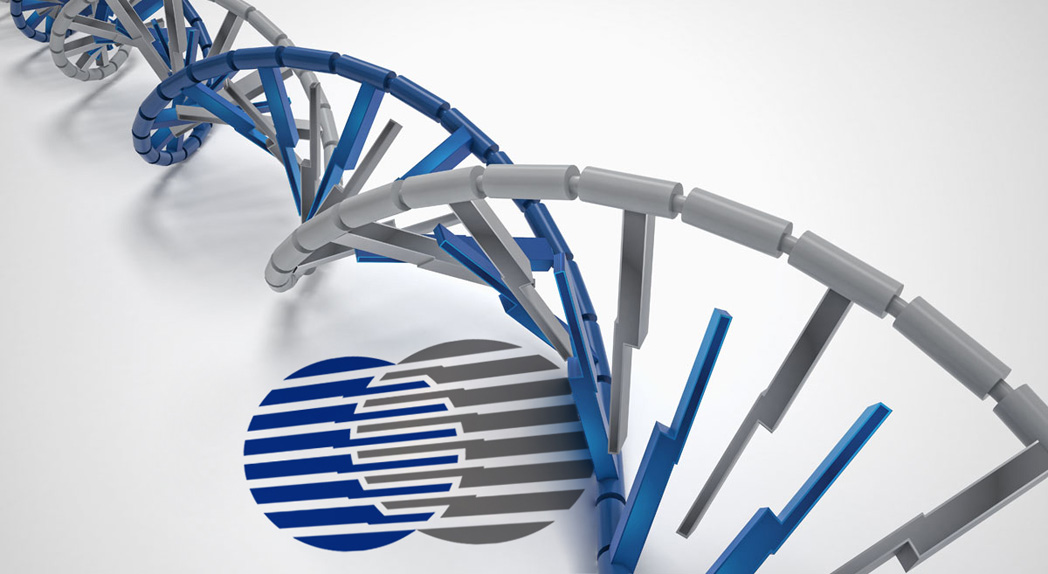About DEİK
Foreign Economic Relations Board (DEİK), Türkiye’s window to the world; is a voluntary-based business organization, aiming at strengthening the Turkish private sector since 1985.
With a key focus on “Business Diplomacy”, DEİK has been working on developing foreign economic relations of Türkiye’s private sector, seeking both foreign and domestic investment opportunities and enhancing bilateral trade between Türkiye and its potential partners.
With its 153 Business Councils worldwide, DEİK mainly acts to improve Türkiye’s trade and investment relations in a strategic manner with direct contact in these 145 countries.
DEİK is working with the task of “conducting the foreign economic relations of the Turkish private sector”. It is carried out under the coordination of the Ministry of Trade.

DEiK in Figures

Total Business
Councils
153
Bilateral Business Councils
145
Sector-specific Business Councils
6
Special Purpose Business Councils
2
DEiK’s Vision
Türkiye:
- Serving as an example for economic and political development on a regional and global level based on cooperation between the private and the public sector and civil society;
- Achieving macro-economic stability;
- Being globally competitive with leading entrepreneurs and brands;
- Producing high-tech;
- Innovating;
- Having a significant share in world trade;
- Being one of the world’s foremost investment,finance and R&D centres;
- Applying modern standards in all areas.
DEiK’s Mission
DEİK is an important representative of the Turkish economy and its productive, value adding, employment and foreign trade potential. DEİK owes this capacity to both its Founding Institutions and the companies represented by its members.
DEİK wants to fulfill its duty in the establishment of a social order committed to a competitive market economy, sustainable development and participative democracy.

DEiK’s Endeavor
DEİK organizes international events, gathering high-level representatives, politicians, business people, entrepreneurs, academicians and representatives of non-governmental organizations, from both Türkiye and other organizations. The objective of DEİK is to develop commercial or cross-sector cooperation between Türkiye and other countries and to increase bilateral trade volume.
DEİK endeavors to establish cooperation with international organizations and to create novel opportunities for the Turkish business community through its studies.
Besides “events, DEİK is also committed to “competency”-oriented activities, carrying out strategy development studies on matters that fall within the scope of foreign economic relations. DEİK sheds light on the foreign economic relations of the Turkish business community by preparing reports and publications, and organizing events.

The Structure of DEİK
DEİK carries out its activities with the support of its Founding Institutions and Corporate Members, each of which is a strong representative of the Turkish private sector, under the knowledge and supervision of the General Assembly, Board of Directors, Board of Executives and Board of Auditors.
The Business Councils, which form the backbone of DEİK, are responsible for implementing the decisions taken by the DEİK Board of Directors and the DEİK General Assembly.
Board of Executives
Board of Executives of DEİK is composed of 12 members selected from among its own members by the Board of Directors and the Chair of the Board of Executives. The Chair of the Board of Directors also serves as the Chair of the Executive Board. Four members of the Executive Board are the Presidents of the four main Founding Institutions. The Treasurer Member is an ex officio member of the Executive Board. The DEİK Board of Directors elects two members of the Executive Board from among other founding institutions or corporate members, four members from among the Chairs of Business Councils, and one member from among the other members of the General Assembly.
DEiK’s Business Council
Business Councils that are responsible for applying the decisions taken at ‘DEİK Board of Directors’ or ‘Business Council Executive Board’ are the backbone mechanisms of DEİK.
Working towards establishing bilateral and multilateral corporate cooperation within the framework of the countries under their responsibility, sectors and purposes, Business Councils are structured in three different categories as: ‘Country-Based Business Councils’, ‘Sectoral Business Councils’ and ‘Special-Purpose Business Councils’.
Board of Directors
The President of the DEİK Board of Directors is appointed by the Turkish Minister of Trade. The DEİK Board of Directors consists of 35 members, including one President, who are elected by the General Assembly for a four-year term. The DEİK Board of Directors is composed of four principal members representing the founding institutions (TOBB, TİM, MÜSİAD, and TMB), as well as other members selected from among the representatives of the founding institutions, the Chairpersons of the Business Councils, and the delegates.
Board of Auditors
Board of Auditors of DEİK consists of five principal and five alternate members, who are elected from among the delegates by the DEİK Elective General Assembly for a four-year term.
Members of Board of Auditors of DEİK must not hold positions in other DEİK or Business Council bodies.
General Secretariat
The General Secretariat is the executive body composed of a professional team, led by the Secretary General as its highest-ranking official. The General Secretariat is responsible for carrying out the activities of DEİK and its Business Councils as defined by the DEİK Regulations, in line with the decisions of the Board of Directors, the Board of Executives, and the Executive Boards of the Business Councils. The General Secretariat is authorized to plan, execute, and report all DEİK activities.
The General Secretariat guides and coordinates the work of the Business Councils within the framework of strategies and policy recommendations set by the Board of Directors. Additionally, the General Secretariat manages communication with Member Companies, Founding Institutions, Corporate Members, and other institutions and organizations within the ecosystem.

DEiK’s Business Councils
Business Councils that are responsible for applying the decisions taken at ‘DEİK Board of Directors’ or ‘Business Council Executive Board’ are the backbone mechanisms of DEİK.
Working towards establishing bilateral and multilateral corporate cooperation within the framework of the countries under their responsibility, sectors and purposes, Business Councils are structured in three different categories as: ‘Country-Based Business Councils’, ‘Sectoral Business Councils’ and ‘Special-Purpose Business Councils’.
Business Councils with Specific Purposes
World Turkish Business Council (DTİK) unites under a common roof Turkish business community and entrepreneurs located abroad. The purpose of the Outbound Investments Business Council is to understand the dynamics of Turkish private sector investments in foreign countries, to generate solutions for needs arising in connection with foreign investments, and to ensure a high degree of coordination with the public in this respect.
Working Principles of Business Councils
Business Councils are categorized by country, sector, or specific purpose. The General Assemblies of the Business Councils are held regularly each year, and every two years, Elective General Assemblies of the Business Councils take place.
During the DEİK Business Councils' Elective General Assemblies, the Chairpersons and Executive Boards of the Business Councils are elected. The Executive Boards of the Business Councils meet regularly to assess bilateral and multilateral cooperation opportunities, address issues, and discuss current developments.
The Business Councils develop recommendations on policies and solutions necessary for enhancing commercial and economic relations, in alignment with the main strategy set by the Board of Directors.
Country-Based Business Councils
The purpose of Country-Based Business Councils that are established based on cooperation agreements signed with counterpart organizations is to develop and deepen bilateral economic relations with the concerned countries.
Sectoral Business Councils
The purpose of Sectoral Business Councils is to gather valuable sector-related information in one place and, in collaboration with the public and private sector as well as with civil society organizations, to establish development plans.

